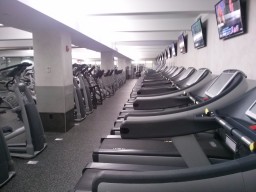September 23, 2017
A SIMPLE GUIDE TO GETTING IN-SHAPE

1- Nutrition (Protein, Carbs & Fat)
2- Resistance training
3- Cardio
4- Rest
Nutrition:
It’s amazing how many people just don’t eat or eliminate carbs thinking they’ll lose weight. They will in the short term, but mainly from water & muscles. Which leads to gaining fat by slowing down your metabolism. Also, deterioration of bone mass (osteoporosis), reduced energy, etc. Scrolling over fad diets, fitness articles, nutrition advice, fitness experts, etc. There’s a lot of misinformation, contradicting information & countless options that it could become very confusing. Some fitness experts add to this confusion, either through lack the knowledge, self interest, incompetence, lazy or simply unprofessional.
It’s amazing how many people just don’t eat or eliminate carbs thinking they’ll lose weight. They will in the short term, but mainly from water & muscles. Which leads to gaining fat by slowing down your metabolism. Also, deterioration of bone mass (osteoporosis), reduced energy, etc. Scrolling over fad diets, fitness articles, nutrition advice, fitness experts, etc. There’s a lot of misinformation, contradicting information & countless options that it could become very confusing. Some fitness experts add to this confusion, either through lack the knowledge, self interest, incompetence, lazy or simply unprofessional.
 The goal is to feed your lean tissue (muscles) & starve/burn the fat. That’s where quality protein, carbs & fat comes in. Tied to a realistic goal of losing 1 – 2lbs of FAT a week. Goals of losing more than 2lbs a week is not healthy or sustainable over an extended period of time. A goal of losing 4 a week for example, require a reduction in daily calories by 2,000. Most people barely eat 2,000 calories daily. A goal of losing 2 lbs a week requires a 1,000 reduction in daily calories.
The goal is to feed your lean tissue (muscles) & starve/burn the fat. That’s where quality protein, carbs & fat comes in. Tied to a realistic goal of losing 1 – 2lbs of FAT a week. Goals of losing more than 2lbs a week is not healthy or sustainable over an extended period of time. A goal of losing 4 a week for example, require a reduction in daily calories by 2,000. Most people barely eat 2,000 calories daily. A goal of losing 2 lbs a week requires a 1,000 reduction in daily calories.
Hydration, a very important but often overlooked part of nutrition & plays a huge role in losing weight & keeping you cells, tissues & organs functioning efficiently. 8 servings of 8oz of water is the minimum required amount for most people. Adjustments are made based on the environment, training intensity, age, fitness level, etc.
 Resistance Training:
Resistance Training: Lifting weights will NOT make you big & bulky (especially female), just like pilates or yoga won’t make your limbs longer. All 3 however, will make you healthier mentally & physically. Except for age & injuries, Unless you surgically go into someone’s joints & change the attachments, you’re not going to lengthen or shorten the muscles. You can make the muscles more limber, stronger, bigger (with significant effort) but not longer or shorter.
As a pro bodybuilder, I know how difficult it is to build muscles.
Unless that’s your goal, you train 2 hrs a day, 4 – 6 days a week, lift heavy, have a genetic predisposition or supplement with muscle building hormones, it’s extremely unlikely & even less more unlikely if you’re a female.
If you’re lifting a weight for 25 or more reps, you’re not training anaerobically (muscles). It has to offers appropriate resistance, causing the muscle to fail at around the 20th rep or earlier. Use this philosophy & try to work each muscle group individually. If you can’t or don’t want to isolate each group, be sure to work the larger groups such as back, legs & chest. This will incorporate the rest of the body parts into play on a secondary nature.
 Cardiovascular Exercise:
Cardiovascular Exercise: Any exercise that elevates the heart rate. Larger muscle groups are more effectively, ideally legs or back. Therefore, the treadmill, bike, elypitcal, rower, outdoor running, sprints, etc are preferred. cardio vascular training targets the most important muscle in the body, the heart (& circulatory system). If that isn’t working efficiently, you’ll have significant problems if it’s not corrected. Cardio ideally should be done 3-5 times weekly for 20 minutes or more. If you can’t do 20 minutes, start with less and work your way up. Keeping in mind that duration is more important than intensity, as you’re able to reach 20 minutes, you can start focusing on intensity.
Rest:
The harder you train, the more you need to rest (recovery). Often times, the difference between appropriate training & overtraining, progressing or regressing is rest. Most people need 7-9 hrs of uninterrupted sleep daily. Uninterrupted because the majority of the benefits you gain from resting starts approximately 1 hr into your deep sleep. If you can’t for whatever reason, the next best thing is to take naps. Again, you’re getting the benefits of your training while you rest, not while you train, the muscles get broken down during exercise & repairs itself during rest.
The harder you train, the more you need to rest (recovery). Often times, the difference between appropriate training & overtraining, progressing or regressing is rest. Most people need 7-9 hrs of uninterrupted sleep daily. Uninterrupted because the majority of the benefits you gain from resting starts approximately 1 hr into your deep sleep. If you can’t for whatever reason, the next best thing is to take naps. Again, you’re getting the benefits of your training while you rest, not while you train, the muscles get broken down during exercise & repairs itself during rest.












